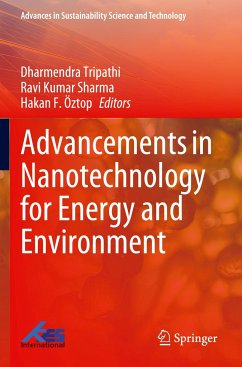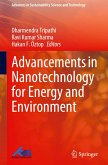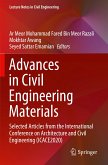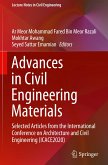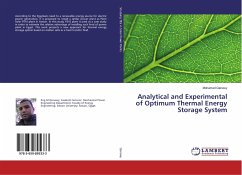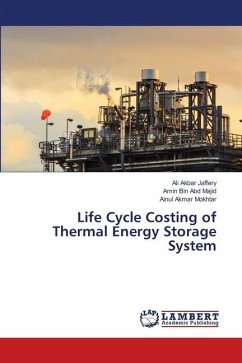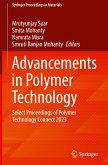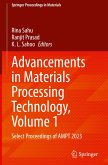Advancements in Nanotechnology for Energy and Environment
Herausgegeben:Tripathi, Dharmendra; Sharma, Ravi Kumar; Öztop, Hakan F.
Advancements in Nanotechnology for Energy and Environment
Herausgegeben:Tripathi, Dharmendra; Sharma, Ravi Kumar; Öztop, Hakan F.
- Broschiertes Buch
- Merkliste
- Auf die Merkliste
- Bewerten Bewerten
- Teilen
- Produkt teilen
- Produkterinnerung
- Produkterinnerung
This book presents a very useful and valuable collection of chapters associated with recent developments in energy, environment, and nanotechnology including nanofluids dynamics. The book provides insights related to various forms of nanotechnological applications in green buildings, environmental and electrochemical systems, solar distillation systems, green energy, storage tank of the solar water heating systems, solar concentrator system's receiver, solar adsorption refrigeration system, and CFD simulations of various aspects of nanofluids/hybrid nanofluids, which are particularly useful,…mehr
Andere Kunden interessierten sich auch für
![Advancements in Nanotechnology for Energy and Environment Advancements in Nanotechnology for Energy and Environment]() Advancements in Nanotechnology for Energy and Environment121,99 €
Advancements in Nanotechnology for Energy and Environment121,99 €![Advances in Civil Engineering Materials Advances in Civil Engineering Materials]() Advances in Civil Engineering Materials89,99 €
Advances in Civil Engineering Materials89,99 €![Advances in Civil Engineering Materials Advances in Civil Engineering Materials]() Advances in Civil Engineering Materials121,99 €
Advances in Civil Engineering Materials121,99 €![Analytical and Experimental of Optimum Thermal Energy Storage System Analytical and Experimental of Optimum Thermal Energy Storage System]() Mohamed QenawyAnalytical and Experimental of Optimum Thermal Energy Storage System35,99 €
Mohamed QenawyAnalytical and Experimental of Optimum Thermal Energy Storage System35,99 €![Life Cycle Costing of Thermal Energy Storage System Life Cycle Costing of Thermal Energy Storage System]() Ali Akbar JafferyLife Cycle Costing of Thermal Energy Storage System31,99 €
Ali Akbar JafferyLife Cycle Costing of Thermal Energy Storage System31,99 €![Advancements in Polymer Technology Advancements in Polymer Technology]() Advancements in Polymer Technology137,99 €
Advancements in Polymer Technology137,99 €![Advancements in Materials Processing Technology, Volume 1 Advancements in Materials Processing Technology, Volume 1]() Advancements in Materials Processing Technology, Volume 1137,99 €
Advancements in Materials Processing Technology, Volume 1137,99 €-
-
-
This book presents a very useful and valuable collection of chapters associated with recent developments in energy, environment, and nanotechnology including nanofluids dynamics. The book provides insights related to various forms of nanotechnological applications in green buildings, environmental and electrochemical systems, solar distillation systems, green energy, storage tank of the solar water heating systems, solar concentrator system's receiver, solar adsorption refrigeration system, and CFD simulations of various aspects of nanofluids/hybrid nanofluids, which are particularly useful, valuable for the betterment of society, culture, and ultimately mankind.
Produktdetails
- Produktdetails
- Advances in Sustainability Science and Technology
- Verlag: Springer / Springer Nature Singapore / Springer, Berlin
- Artikelnr. des Verlages: 978-981-19-5203-6
- 1st edition 2022
- Seitenzahl: 308
- Erscheinungstermin: 18. September 2023
- Englisch
- Abmessung: 235mm x 155mm x 16mm
- Gewicht: 526g
- ISBN-13: 9789811952036
- ISBN-10: 9811952035
- Artikelnr.: 68671529
- Herstellerkennzeichnung Die Herstellerinformationen sind derzeit nicht verfügbar.
- Advances in Sustainability Science and Technology
- Verlag: Springer / Springer Nature Singapore / Springer, Berlin
- Artikelnr. des Verlages: 978-981-19-5203-6
- 1st edition 2022
- Seitenzahl: 308
- Erscheinungstermin: 18. September 2023
- Englisch
- Abmessung: 235mm x 155mm x 16mm
- Gewicht: 526g
- ISBN-13: 9789811952036
- ISBN-10: 9811952035
- Artikelnr.: 68671529
- Herstellerkennzeichnung Die Herstellerinformationen sind derzeit nicht verfügbar.
Dharmendra Tripathi has been working as Associate Professor in Department of Mathematics, National Institute of Technology, Uttarakhand. Prior to joining NIT Uttarakhand, he has worked more than 11 years as Faculty Member (Associate Professor, Assistant Professor) in various reputed institutions like Manipal University Jaipur, NIT Delhi, IIT Ropar, and BITS Pilani, Hyderabad. He has completed his Ph.D. in Applied Mathematics (Mathematical Modelling of Physiological flows) in 2009 from Indian Institute of Technology BHU and M.Sc. in Mathematics from Banaras Hindu University. He has supervised 06 Ph.D. students and 03 are working under his supervision. He has also guided 20 B.Tech. projects. He has published more than 160 papers in reputed international journals, 01 edited Book in Springer, 01 edited Book in CRC, 10 book chapters and presented more than 40 papers in International and National Conferences. He has delivered more than 100 lectures as Invited Speaker, Keynote Speaker, and Resource Person in various conferences, workshops, FDP, STTP, STC, refresher courses, etc. His research h-index is 41 and i-10 index is 127, and his papers have more than 5300 citations. He has been listed in top 2% researchers/scientist across the world as per updated science-wide author databases of standardized citation indicators in year 2020 and year 2021. He has received President Award in 2017 by the Manipal University Jaipur for outstanding contribution, Prof PR Sharma Memorial award from International Academy for Physical Sciences (IAPS) in 2021 and also become Associate Fellow of IAPS in 2022. He has been recognized by the Head of Institution for excellent work and contribution for the NIT Uttarakhand and also recognized by various reputed journals for reviewing the articles and editing the special issues for the journals. He was awarded some prestigious fellowships INAE fellowship in 2015 and 2016, 2017, and 2018, postdoctoral fellowships (NBHM, Dr D.S. Kothari and Indo-EU) in 2010, etc. He has also organized various events like National and International conferences/STC/STTP /FDP/Workshops/Winter Schools on various emerging topics. He is Life Time Member of various professional bodies, Member of editorial board of two journals, and Reviewer of more than 50 International Journals. His research work is focused on the mathematical modelling and simulation of biological flows in deformable domains, peristaltic flow of Newtonian and non-Newtonian fluids, membrane-based pumping flow models; dynamics of various infectious diseases; microfluidics; CFD, biomechanics; heat transfer; nanofluids; energy systems; numerical methods; etc. Ravi Kumar Sharma has been working with Manipal University Jaipur as Professor and Director of Entrepreneurship cell at Manipal University Jaipur. He has total of 15 years of teaching and research experience in various reputed Indian and foreign universities. He earned his Ph.D. in Thermal Engineering from the University of Malaya, Malaysia, in 2016, and Master from BITS Pilani, India. He has published 50 research papers in international journals of repute and presented his research work in many international conferences in India and abroad. He has also written 5 book chapters and one edited book published by Springer and reviewer of many international journals. He has also delivered numerous invited/keynote speeches in FDP/STTP/Workshop, and conferences. His current area of research is renewable energy and thermal energy storage, in particular solar energy. His primary research is focused on the development of phase change materials or rapid heat transfer by enhancing their thermal conductivity. Dr Sharma has supervised 3 Ph.Ds successfully and currently supervising 04 Ph.Ds. He is also working on the development of carbon-based materials. His research is being cited globally, and one of his papers has been in the top downloaded articles and most cited in the journal formore than a year. Hakan F. Öztop has been working as Full Professor in Department of Mechanical Engineering, Technology Faculty, F¿rat University, Elazig, Turkey. He got his Master and Ph.D. degrees on Computational Fluid Dynamics (CFD) in the same university. He had been in Universite De Montreal, Canada during his Ph.D. studies. And, he worked as a postdoc student in the Department of Mechanical Engineering, Auburn University, Alabama, USA. He has supervised 4 Ph.D. students and 13 Master student under his supervision. His research h-index is 80 and i-10 index is 334, and his papers have more than 22000 citations. He is in Highly Citation Researchers (HCR) list since 2018. His research areas are nanofluids, CFD, energy storage, drying applications, solar energy and natural, and mixed convection heat transfer and combustion.
Chapter 1. Applications of Nanotechnology through the Ages: A Socio & Eco-critical Study for Humankind.- Chapter 2. Electrodes coated with nanomaterials and their use for environmental and electrochemical applications.- Chapter 3. Nanotechnology: The future for Green Buildings.- Chapter 4. Application of green energy for drying of food products.- Chapter 5. Application of latent heat storage materials in the storage tank of the SWH system.- Chapter 6. Different degradation modes of PV modules: An overview.- Chapter 7. Thermal performance assessment review of the solar concentrator system's receiver utilized for high-temperature applications.- Chapter 8. Performance of solar adsorption refrigeration system: a case study of a two-stage freezing system with varying thermal conductivity and permeability of adsorbents.- Chapter 9. Combined utilization of inclined fins and CNT nanofluid on thermoelectric energy conversion performance in channel flow.- Chapter 10. Analogy between Darcy-Be nard convection problems involving a clear fluid and a nanofluid: An illustration.- Chapter 11. Thermal Radiation and Natural Convection in the Flow of Hybrid Nanofluid across a Permeable Longitudinal Moving Fin using TOPSIS.- Chapter 12. Radiation Effect on Rayleigh-Bénard Convection in Nanofluids: General Boundary Condition.- Chapter 13. Study of quadratic Boussinesq convection in non-Newtonian fluid with quadratic Rosseland thermal radiation.- Chapter 14. Composite nanofluids flow driven by electroosmosis through squeezing parallel plates in presence of magnetic fields.
Chapter 1. Applications of Nanotechnology through the Ages: A Socio & Eco-critical Study for Humankind.- Chapter 2. Electrodes coated with nanomaterials and their use for environmental and electrochemical applications.- Chapter 3. Nanotechnology: The future for Green Buildings.- Chapter 4. Application of green energy for drying of food products.- Chapter 5. Application of latent heat storage materials in the storage tank of the SWH system.- Chapter 6. Different degradation modes of PV modules: An overview.- Chapter 7. Thermal performance assessment review of the solar concentrator system's receiver utilized for high-temperature applications.- Chapter 8. Performance of solar adsorption refrigeration system: a case study of a two-stage freezing system with varying thermal conductivity and permeability of adsorbents.- Chapter 9. Combined utilization of inclined fins and CNT nanofluid on thermoelectric energy conversion performance in channel flow.- Chapter 10. Analogy between Darcy-Be nard convection problems involving a clear fluid and a nanofluid: An illustration.- Chapter 11. Thermal Radiation and Natural Convection in the Flow of Hybrid Nanofluid across a Permeable Longitudinal Moving Fin using TOPSIS.- Chapter 12. Radiation Effect on Rayleigh-Bénard Convection in Nanofluids: General Boundary Condition.- Chapter 13. Study of quadratic Boussinesq convection in non-Newtonian fluid with quadratic Rosseland thermal radiation.- Chapter 14. Composite nanofluids flow driven by electroosmosis through squeezing parallel plates in presence of magnetic fields.

